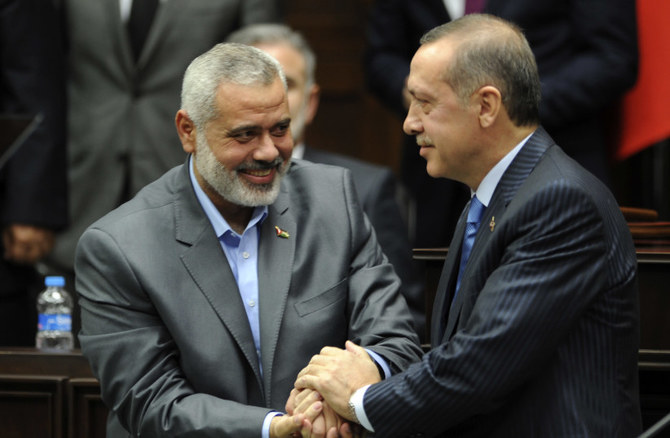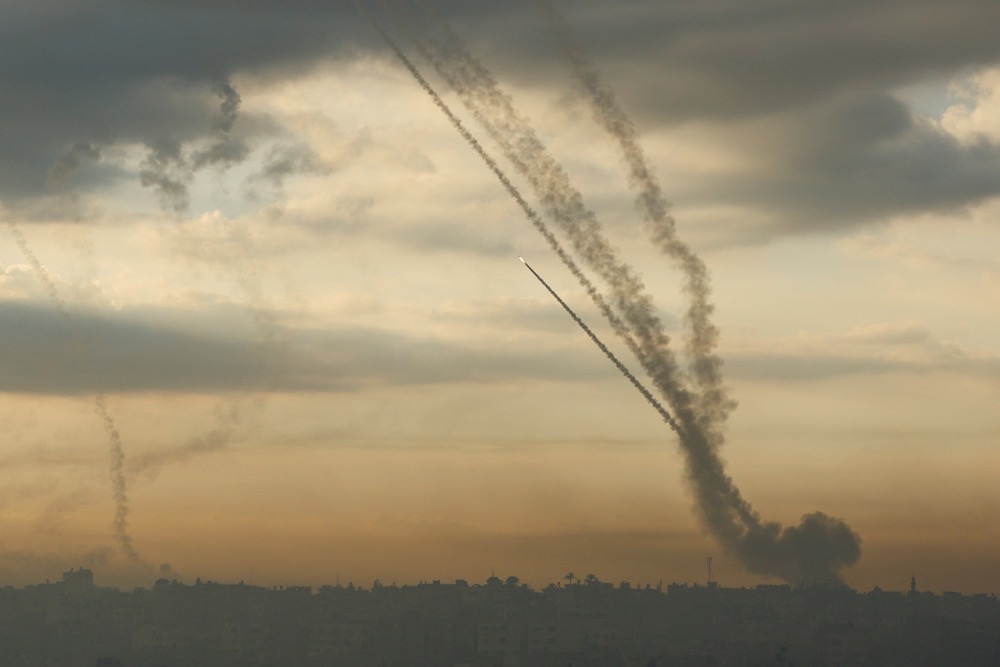JEDDAH: Amid Israeli claims that Turkey has given passports and identity cards to around a dozen Hamas members in Istanbul, ties between Tel Aviv and Ankara have become loaded with accusations of supporting terror groups.
A senior Israeli diplomat said on Aug. 26 the move was a “very unfriendly step.”
Enduring contacts between Ankara and Hamas leaders are not a secret. Despite strong objections from Washington, Turkish President Recep Tayyip Erdogan met Hamas leaders, including its political bureau chief, Ismail Haniyeh, who is on the US terror list, in Istanbul on Aug. 22. Hamas is considered a terror group by the US, Israel and EU.
In retaliation, Israel gives support to the alliance of states that oppose Turkey’s moves in the Eastern Mediterranean, especially Greece and Cyprus, over the maritime delimitation issues and drilling activities in the region.
Israeli Charge d’Affaires Roey Gilad said Israel had already warned Turkey last year that Hamas was conducting “terror-related activities” in Istanbul, and added that Turkey had not taken any action. These Hamas members allegedly came to Turkey in 2011 in exchange for a captured Israeli soldier.
On Tuesday, Unal Cevikoz, a retired diplomat and deputy from the main opposition Republican People’s Party, also suggested that 12 Hamas members had been offered Turkish citizenship, and brought these allegations to the Turkish Parliament by directing an inquiry to Vice President Fuat Oktay.
Cevikoz claimed that Hakan Fidan, Turkey’s spy chief, was also present at the meeting between Erdogan and Haniye.
“These developments pose a serious obstacle to the potential of a two-state solution on the Palestine-Israel issue. Such developments, which will further increase regional tension, prevents Turkey from taking an active role for the Palestinian issue,” Cevikoz said in his statement.
Cevikoz also claimed that the government’s policies isolated the country, and asked the vice president whether Erdogan’s talks with Haniye coincided with Turkey’s interests in maintaining security in the Eastern Mediterranean, considering that Hamas is recognized as a terror group by many countries.
“Ankara’s continued support for Hamas, including rolling out a red carpet for two senior Hamas leaders that the US and others view as wanted terrorists, once against shows the unprecedented way in which Turkey’s current rulers flagrantly ignore international norms. Ankara treats Hamas as if it is an equal government, hosting it at the highest levels,” Seth J. Frantzman, executive director of the Middle East Center for Reporting and Analysis, told Arab News.
According to Frantzman, Turkey appears to prize Hamas members more than other groups.
“Israel is finally making these facts public because of Ankara’s continued threats and hosting of leading terror figures, and because Ankara sought to derail the Israel-UAE agreement,” he said.
Frantzman thinks that Ankara’s goal in cultivating Hamas is to make it part of the government’s web of Muslim Brotherhood-linked organizations and backers in the region, including in Qatar, elements of the Government of National Accord (GNA) in Libya, as well as the group in Egypt which was a key Ankara ally, prior to its 2013 ousting from power.
“Ankara’s Hamas hosting is designed to balance the Israel-UAE agreement and it goes hand-in-hand with Qatar sending an envoy to Gaza. However, whereas Qatar is seen by Israel as more constructive, the recent statements by Ankara’s leaders, claiming they will ‘liberate Al-Aqsa’ are seen as hostile. That is why Israel now backs Greece in the Mediterranean,” he said.
Once allies, Israel and Turkey have taken some steps since 2015 to restore ties after the Mavi Marmara flotilla crisis that severed diplomatic ties in 2009. But, according to Frantzman: “The reconciliation does not progress because Ankara views Israel as one of its main enemies in the world.
“Turkey has sidelined the Palestinian Authority, the legitimate government of the Palestinians, in its attempt to give Hamas legitimacy. This is inevitably heading in the wrong direction in Israel-Turkey ties and Ankara’s push to have influence in the West Bank, Jerusalem and throughout Gaza is part of the overall goal by Ankara to have leverage over Israel and create the kind of crisis it has stoked in the Mediterranean, Libya, Iraq and Syria and the Gulf,” he added.































